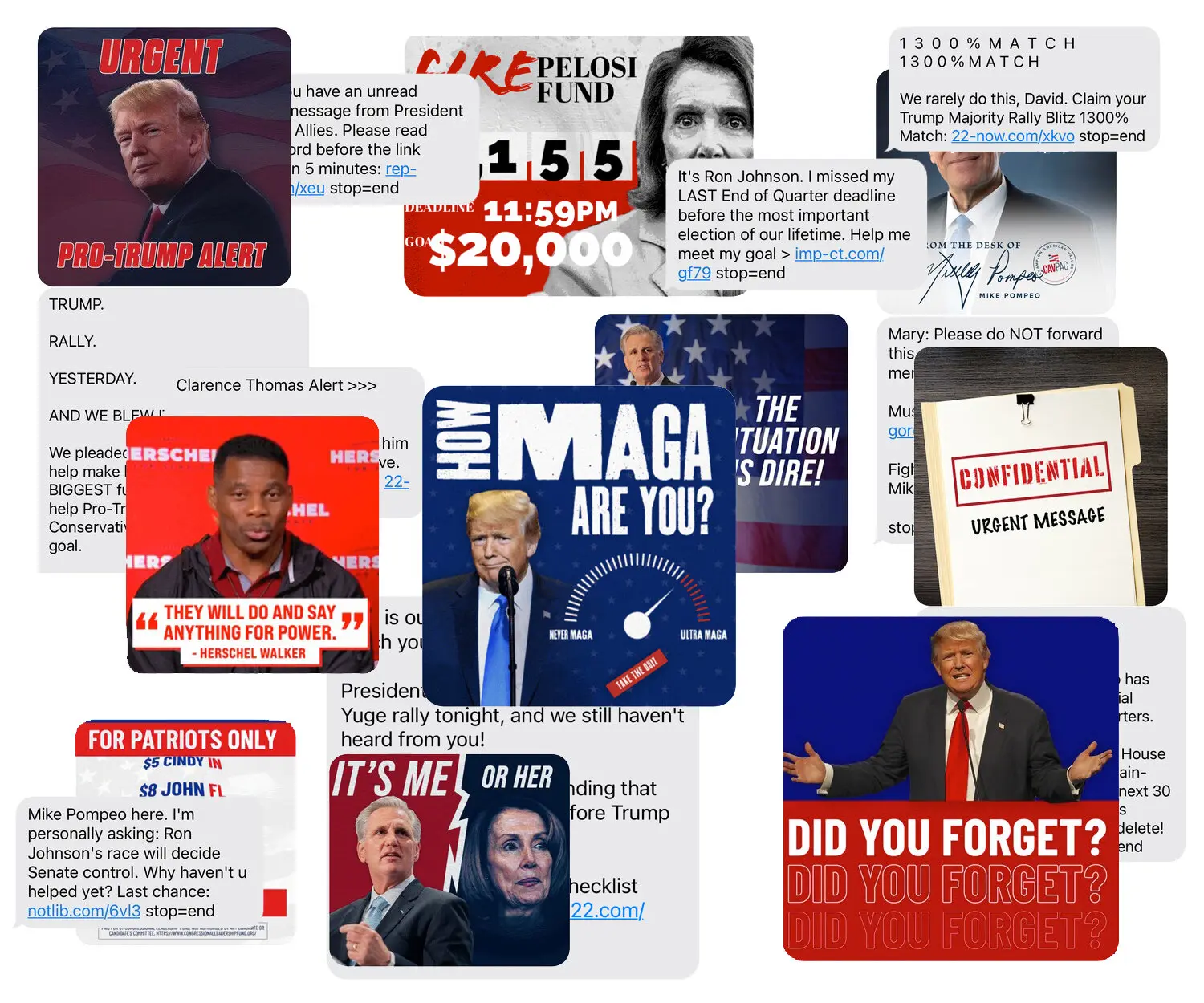Sick of political text messages? Here’s how to stop them
It’s that time of year again. Election season is well underway, as local, state and big-time politicians clamor for your vote in the primaries and come November. Lately, that means less door knocking and more text messages.
Candidates and causes you didn’t even know had your phone number may be blowing up your phone asking for your vote or your money. Campaign phone calls and text messages are exempt from the federal Do Not Call list and the national Do Not Call Registry, so getting on the registry won’t help you turn down the noise. (However, political campaigns do need to follow certain FCC restrictions when reaching out.)
Fortunately, there is any easy way to stop the unwanted political text messages. Legitimate text campaign operators should remove you from the list if you just reply “STOP,” the FCC says.
In addition to opting out, you can also report messages that you didn’t sign up to receive as spam. The FCC asks you forward them to 7726. You can also file a complaint online.
Of course, the above steps only work when it comes to barring legitimate text campaigns from reaching out to you. Scammers are a bit harder to stop. It’s like when you put up a “no trespassing” sign on your property, explained Alex Quilici, CEO of call blocking service YouMail.
“The good guys aren’t going to trespass on your property, and the guy who’s going to burglarize it doesn’t care. We see the exact same thing with the robo-callers and the Do Not Call list. The good guys – like your credit card company – they’re not going to tele-market to you … but the scammers are trying to steal from you.”
Legitimate companies that violate the rules can face a fine of more than $50,000 per call, according to the FTC.
If you’re looking for another option to reduce the clutter in your text inbox, CNET suggests changing your phone settings to filter out all unknown senders. On the downside, you might end up missing text reminders for doctor’s appointments or restaurant reservations.
Fed Up With Political Text Messages? Read On.
In this polarized climate, hundreds of Americans told us they agree on one thing: Campaigns must stop spamming voters’ phones with unwanted political texts.
“Boris, Florida is in trouble,” warned one text message seeking campaign donations — and promising 900 percent matching funds — for Senator Marco Rubio of Florida.
“You have until midnight, Boris,” insisted another campaign text, urging voters to fill out a survey, which came with a photo of former President Donald J. Trump pointing an outstretched forefinger like Uncle Sam.
“It’s Mike Pompeo,” said a third message, which appeared to be from the former director of the Central Intelligence Agency. “I’m not asking for $, Boris. I’m asking you to endorse these GOP veterans running to save America.”
These messages promoting Republicans, addressed to “Boris,” were among a flood of more than 150 unsolicited texts sent during one month this fall to Lorraine Barba, a Democrat in Wilmette, Ill.
Ms. Barba, whose phone number had been briefly commandeered by a man named Boris, found the unwanted messages on her iPhone intrusive. She repeatedly tried to opt out of by typing “STOP” — to no avail.
“My phone was constantly pinging,” Ms. Barba said, adding that she was troubled “by the relentlessness of it.”
She is hardly alone. In October, people in the United States received an estimated 1.29 billion political text messages — about twice as many as in April — according to RoboKiller, an app that blocks Robocalls and spam texts. Many voters have complaints about it.
more than 940 readers across the political spectrum shared their experiences, describing a hail of inflammatory messages from both parties. To illustrate their concerns, readers also submitted more than 1,000 images of the political texts on their phones. Many were rife with divisive language or deceptive content.
The campaign messages not only capture some voters’ deep frustrations with unwanted political texts. They also document how political texting is becoming a go-to method for spreading doomsday scenarios, lies and campaign smears.
In other words, texting is a handy method for political actors to quietly propagate the same kind of divisiveness and disinformation that already abounds on social media — only away from the public scrutiny of academic researchers, fact-checking groups and journalists.
“I’m disturbed by the divisive language, the lies about election fraud and the fact that, after requesting to unsubscribe, I was even sent the exact same text immediately after,” wrote Ailin Cao, a software engineer in Washington, D.C.
In some cases, the campaign texts did not clearly disclose their sponsors. Others solicited donations for, and contained links to, unknown entities — making it difficult to distinguish real campaign messages from spam and fund-raising scams.

Consumers filed 9,477 fraud reports related to political text messages with the Federal Trade Commission in fiscal year 2022. Separately, the Federal Communications Commission received about 2,100 complaints related to political texts over the last year.
Sometimes though they still get by
Here’s Why being on the ‘Do Not Call’ list doesn’t actually stop spam calls, texts
Sick of unwanted calls and texts bombarding your phone? Your first stop is probably the national Do Not Call list and the national Do Not Call Registry, which threatens telemarketers with a hefty fine if they contact people on the list.
The official Do Not Call list has grown to 221 million phone numbers and counting, the Federal Trade Commission says – so why haven’t spammers, scammers and robo-callers gone out of business yet?
The answer may be hiding in the fine print. The Do Not Call list doesn’t actually block everyone from reaching out to you unsolicited. The FTC rules still allow calls about political campaigns, charities, debt collections and surveys to go through, even if you’re on the registry.
Telemarketers are also still allowed to reach out to you with a sales pitch if you’ve recently done business with the company.
Then there’s the fact that not everyone plays by the rules.
It’s like when you put up a “no trespassing” sign on your property, explained Alex Quilici, CEO of call blocking service YouMail.
“The good guys aren’t going to trespass on your property, and the guy who’s going to burglarize it doesn’t care. We see the exact same thing with the robo-callers and the Do Not Call list. The good guys – like your credit card company – they’re not going to tele-market to you … but the scammers are trying to steal from you. So who cares about a penalty for making a phone call? And so that’s why it doesn’t really work.”
Legitimate companies that violate the Do Not Call rules can face a fine of more than $50,000 per call, according to the FTC.
But illegitimate, bad actors have actually used the registry to their benefit in the past, Quilici said. “They specifically targeted people whose numbers were on the ‘Do Not Call.’ And they did that because they were more likely to have those people answer.”
You can sign up for the Do Not Call Registry here. If you want to reduce unwanted calls even more, the FTC recommends looking into call-screening apps. source

